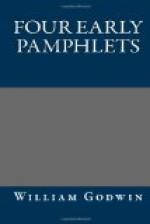We cannot bestow equal praise upon his impartiality. Conscious however and reserved upon general questions, the historian has restricted himself almost entirely to the narrative form, and has seldom indulged us with, what we esteem the principal ornament of elegant history, reflexion and character. The situation of Dr. Robertson may suggest to us an obvious, though incompetent, motive in the present instance. Writing for his contemporaries and countrymen, he could not treat the resistance of America, as the respectable struggle of an emerging nation. Writing for posterity, he could not denominate treason and rebellion, that which success, at least, had stamped with the signatures of gallantry and applause. But such could not have been the motives of the writer in that part of the history of America, which was given to the world some years ago. Perhaps Dr. Robertson was willing to try, how far his abilities could render the most naked story agreeable and interesting. We will allow him to have succeeded. But we could well have spared the experiment.
The style of this performance is sweet and eloquent. We hope however that we shall not expose ourselves to the charge of fastidiousness, when we complain that it is rather too uniformly so. The narrative is indeed occasionally enlivened, and the language picturesque. But in general we search in vain for some roughness to relieve the eye, and some sharpness to provoke the palate. One full and sweeping period succeeds another, and though pleased and gratified at first, the attention gradually becomes languid.
It would not perhaps be an unentertaining employment to compare the style of Dr. Robertson’s present work with that of his first publication, the admired History of Scotland. The language of that performance is indeed interspersed with provincial and inelegant modes of expression, and the periods are often unskilfully divided. But it has a vigour and spirit, to which such faults are easily pardoned. We can say of it, what we can scarcely say of any of the author’s later publications, that he has thrown his whole strength into it.
In that instance however he entered the lists with almost the only historian, with whom Dr. Robertson must appear to disadvantage, the incomparable Hume. In the comparison, we cannot but acknowledge that the eloquence of the former speaks the professor, not the man of the world. He reasons indeed, but it is with the reasons of logic; and not with the acuteness of philosophy, and the intuition of genius. Let not the living historian be offended. To be second to Hume, in our opinion might satisfy the ambition of a Livy or a Tacitus.
ARTICLE III.
SECRET HISTORY OF THEODORE ALBERT MAXIMILIAN, PRINCE OF HOHENZOLLERN SIGMARINGEN. 12MO.
This agreeable tale appears to be the production of the noble author of the Modern Anecdote. It is told with the same humour and careless vivacity. The design is to ridicule the cold pedantry that judges of youth, without making any allowance for the warmth of inexperience, and the charms of beauty. Such readers as take up a book merely for entertainment, and do not quarrel with an author that does not scrupulously confine himself within the limits of moral instruction, will infallibly find their account in it.




